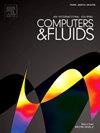Parallel large eddy simulations with curvilinear immersed boundary method for high-speed flows
IF 2.5
3区 工程技术
Q3 COMPUTER SCIENCE, INTERDISCIPLINARY APPLICATIONS
引用次数: 0
Abstract
A sharp-interface immersed boundary method is developed to simulate turbulent compressible flows through large-eddy simulations (LES) on curvilinear grids. The curvilinear grid enables increasing the grid resolution near regions of interest such as solid walls. To capture both shocks and turbulence, the equations are discretized using a hybrid discretization comprising a fourth-order skew-central scheme and a third-order weighted essentially nonoscillatory (WENO) scheme. A switch function is incorporated to switch between WENO in the vicinity of shocks to central far away from shocks. A dynamics Smagornisky model is used to model the subgrid scales for the central scheme. The interpolation for the immersed boundary is modified to incorporate wall functions. The code is parallelized to efficiently run on thousands of CPU cores for highly resolved grids. The method is verified and validated against several test cases including a decaying isotropic turbulent flow, turbulent channel flow, supersonic flow and shock diffraction over a cylinder. The results show that the LES can properly resolve the inertial subrange and the hybrid scheme can effectively capture shocks over the immersed bodies. It is observed that highly refined grids and low-dissipation hybrid scheme are necessary to capture fine turbulence features such as shear instabilities and shock boundary layer interaction over immersed bodies. In fine grids, however, the importance of explicit LES modeling decreases as most scales are resolved and the WENO scheme provides the dissipation implicitly. In such cases, the results are most sensitive to wall modeling which demonstrate the need for development of wall models for high-speed flows.
高速流动曲线浸入边界法平行大涡模拟
利用曲线网格上的大涡模拟(LES),提出了一种锐利界面浸入边界法来模拟湍流可压缩流动。曲线网格可以提高感兴趣区域(如实体墙)附近的网格分辨率。为了捕获冲击和湍流,方程采用混合离散化,包括四阶偏中心格式和三阶加权基本非振荡(WENO)格式。一个开关功能被纳入到在冲击附近的WENO和远离冲击的中心之间切换。采用动态Smagornisky模型对中心方案的子网格尺度进行建模。对浸入边界的插值进行了修改,加入了壁面函数。代码是并行的,以有效地运行在数千个CPU核心的高分辨率网格。通过对衰减各向同性湍流、湍流通道流、超音速流和圆柱激波衍射等实验进行了验证。结果表明,该方法能较好地分解惯性子范围,混合方案能有效捕获沉体上的冲击。观察到高度精细的网格和低耗散的混合格式对于捕获诸如剪切不稳定性和激波边界层相互作用等精细湍流特征是必要的。然而,在精细网格中,显式LES建模的重要性降低,因为大多数尺度被分解,而WENO方案隐含地提供了耗散。在这种情况下,结果对壁面建模最为敏感,这表明需要开发高速流动的壁面模型。
本文章由计算机程序翻译,如有差异,请以英文原文为准。
求助全文
约1分钟内获得全文
求助全文
来源期刊

Computers & Fluids
物理-计算机:跨学科应用
CiteScore
5.30
自引率
7.10%
发文量
242
审稿时长
10.8 months
期刊介绍:
Computers & Fluids is multidisciplinary. The term ''fluid'' is interpreted in the broadest sense. Hydro- and aerodynamics, high-speed and physical gas dynamics, turbulence and flow stability, multiphase flow, rheology, tribology and fluid-structure interaction are all of interest, provided that computer technique plays a significant role in the associated studies or design methodology.
 求助内容:
求助内容: 应助结果提醒方式:
应助结果提醒方式:


